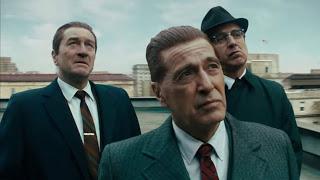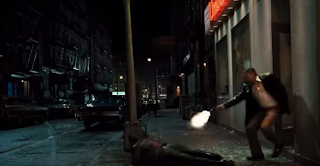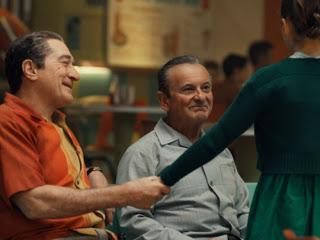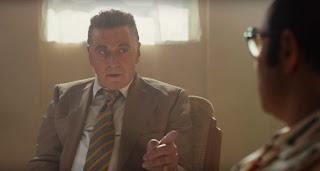 Martin Scorsese's The Irishman (2019) has settled, once and for all, the debate about the cinematic legitimacy of Netflix. Even as the streaming service faces competition from Disney Plus and other in-house channels, it unveiled a massive crime epic with the budget of a Marvel blockbuster and the length of a David Lean movie. For all the hype around its period recreations and extensive de-aging effects, the movie's strength lies in its textured storytelling.
Martin Scorsese's The Irishman (2019) has settled, once and for all, the debate about the cinematic legitimacy of Netflix. Even as the streaming service faces competition from Disney Plus and other in-house channels, it unveiled a massive crime epic with the budget of a Marvel blockbuster and the length of a David Lean movie. For all the hype around its period recreations and extensive de-aging effects, the movie's strength lies in its textured storytelling.Frank Sheeran (Robert De Niro) goes from delivery driver to enforcer for Philadelphia mobster Russell Bufalino (Joe Pesci) in the '50s and '60s. He also becomes president of a Teamsters Local, which in turn brings him into the orbit of Jimmy Hoffa (Al Pacino). The flamboyant union boss clashes with both government officials and his own underlings, especially after his feud with Bobby Kennedy (Jack Huston) lands him in prison. After Hoffa's release, he grows increasingly defiant towards his benefactors, who enlist Frank to eliminate Hoffa. Sheeran reluctantly carries out the hit and spends the rest of his life living with the consequences.
Based on Sheeran's memoirs (the historicity of which are heavily disputed), The Irishman serves as a bitter coda to Scorsese's earlier mob films. Rather than fast-paced glitz and violent burnout, it's a slow, multi-decade portrait of losers decayed by guilt. Scorsese's visual style employs less flourish and color than muted menace, with Rodrigo Prieto's photography alternating sepia tones in restaurants with stark white-gray officers and prison cells. The music heightens this: Scorsese's beloved period tunes are overshadowed by Robbie Robertson's bluesy string-and-percussion score, which become increasingly morose as the film progresses.
 Perhaps most striking, the snappy, profanely colorful dialog of Henry Hill and Ace Rothstein is gone. Instead, Steve Zaillan's screenplay is almost Harold Pinter-esque in lacing menace into banal dialog. Characters discuss cuts of beef, fixing trucks, appropriate times to smoke and, in the movie's signature scene, how long it's acceptable to keep someone waiting. This gives The Irishman an uncommonly slow, leisurely pace that allows Scorsese and Zaillian to probe its characters for depth and nuance far greater than most gangster stories.
Perhaps most striking, the snappy, profanely colorful dialog of Henry Hill and Ace Rothstein is gone. Instead, Steve Zaillan's screenplay is almost Harold Pinter-esque in lacing menace into banal dialog. Characters discuss cuts of beef, fixing trucks, appropriate times to smoke and, in the movie's signature scene, how long it's acceptable to keep someone waiting. This gives The Irishman an uncommonly slow, leisurely pace that allows Scorsese and Zaillian to probe its characters for depth and nuance far greater than most gangster stories.On the surface, The Irishman extends a lot of sympathy towards its protagonists (if not the Mafia itself). Frank and friends aren't that sleazy or psychotic compared to Henry Hill's crew in Goodfellas: Bufalino is a soft-spoken family man while Frank tries (though mostly fails) to be a good father. Murders aren't taken lightly and tend only to occur under the most extreme of circumstances (or else by loose canons the mob has no use for). Yet even without many snappy betrayals and bloody hits, it's clear that they live in a world of paranoia, where a man's value is determined only by how useful they are.
And Frank Sheeran makes a perfect recruit. He's a working class stiff with few dreams, who benefits little from his mob connections. He equates usefulness with loyalty, a precept he never challenges. Whether executing German POWs during World War II, assassinating Bufalino's rivals or carrying out Teamster business, Sheeran never thinks to question orders. His friendship with Bufalino and, later, Hoffa, gives him a job and a purpose. Unfortunately, he's neither smart nor reflective enough to see how much this alienates his family, especially daughter Peggy (Anna Paquin), who early on realizes what kind of man her father is.
 Scorsese does rely on digressive sidebars to provide the requisite gangster mayhem. The segment on Crazy Joe Gallo (Sebastian Maniscalco), inspired by one of Sheeran's more dubious claims, adds some texture and action but no bearing on the story. Historical figures like the Kennedys, Chicago godfather Sam Giancana (Al Linea) and even Howard Hunt (Daniel Jenkins), who meets Sheeran before the Bay of Pigs invasion, are introduced before abruptly disappearing, as if the residue of more substantial subplots pruned for the final version.
Scorsese does rely on digressive sidebars to provide the requisite gangster mayhem. The segment on Crazy Joe Gallo (Sebastian Maniscalco), inspired by one of Sheeran's more dubious claims, adds some texture and action but no bearing on the story. Historical figures like the Kennedys, Chicago godfather Sam Giancana (Al Linea) and even Howard Hunt (Daniel Jenkins), who meets Sheeran before the Bay of Pigs invasion, are introduced before abruptly disappearing, as if the residue of more substantial subplots pruned for the final version.Still, these scenes at least background the meatiest segments. Al Pacino gives his best performance since The Insider, with his fiery performance perfectly suited for the larger-than-life Hoffa. On the one hand, Hoffa believes sincerely in his union and worker's rights. But his massive ego prevents him from seeing the Teamsters as anything but an extension of himself. He's pettily corrupt and quick-tempered, feuding with Teamster underling Tony Pro (Stephen Graham), with whom he physically brawls over minor slights, and politicians like Bobby Kennedy, who jails Hoffa out of spite. He becomes an embarrassment not only to the Teamsters, who replace him with the less abrasive Frank Fitzsimmons (Gary Basaraba), but the mob, who tire of his selfish showboating.
Thus Frank's final mission. Scorsese stages the climax as a long, lingering march to inevitability; Frank's assigned to kill Hoffa while visiting Detroit for a wedding. The scene lacks any traditional suspense but instead unfolds with the inevitability of Greek tragedy. Frank chats with a hit man (Louis Cancelmi) and Hoffa's son (Jesse Plemons) about a fish smell in their car while driving to meet Hoffa, his sad resignation at killing his friend palpable. He gets away with the murder, but ruins his life in the process.
 And here's where The Irishman differs most drastically from Goodfellas or Casino. Those movies stage their protagonist's downfalls with unabashed flare, a flurry of murders and imprisonments that can't help exciting viewers. The Irishman offers none of that: Frank and his friends slowly grow old, dying of banal, everyday illness or languishing in senility. Frank's daughters disown him, and he seems neither to appreciate what he did nor understand why. The coda with a decrepit Frank in a nursing home lets us think that everything we've seen - all the death, the double-crosses, the political squabbles and business deals - amounted to nothing in the end. His reward for loyalty (to Hoffa, to Bufalino) is dying alone in a hospital room.
And here's where The Irishman differs most drastically from Goodfellas or Casino. Those movies stage their protagonist's downfalls with unabashed flare, a flurry of murders and imprisonments that can't help exciting viewers. The Irishman offers none of that: Frank and his friends slowly grow old, dying of banal, everyday illness or languishing in senility. Frank's daughters disown him, and he seems neither to appreciate what he did nor understand why. The coda with a decrepit Frank in a nursing home lets us think that everything we've seen - all the death, the double-crosses, the political squabbles and business deals - amounted to nothing in the end. His reward for loyalty (to Hoffa, to Bufalino) is dying alone in a hospital room.Robert De Niro handles a difficult role uncommonly well: Frank is dense and occasionally even dull, but De Niro's underplaying makes him compelling and quietly tragic, even in his quiet moments. While Al Pacino breathes fire, Joe Pesci plays drastically against-type, his Bufalino a restrained, fatherly man who presents crime as an everyday business. They're matched with game supporting players like Stephen Graham, Bob Cannavale and Ray Romano, surprisingly convincing as Hoffa's slimy lawyer. While Anna Paquin barely says a word and Harvey Keitel's role is a glorified cameo, it's hard to fault Scorsese's casting even for these minor parts.
It's been said that The Godfather is the gangster movie-as-Shakespeare; The Irishman is the gangster movie-as-Euripides. Character determines fate, and neither Frank, nor Hoffa, nor the other players has the temperament or the wit to change course. The device of displaying characters' post-story fates in captions, initially humorous, underlines this. All play their assigned roles, until it drives them to their graves, alone, unloved and forgotten.

